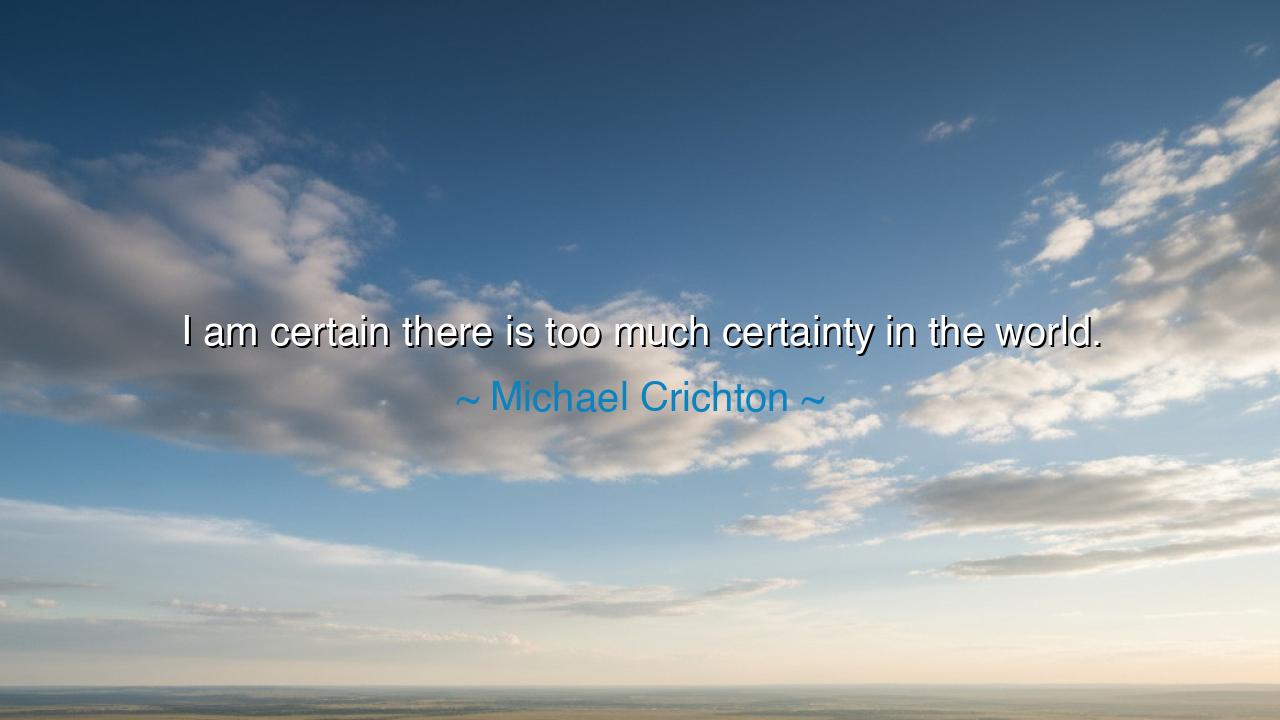
I am certain there is too much certainty in the world.






“I am certain there is too much certainty in the world.” — in this piercing reflection, Michael Crichton, both scientist and storyteller, warns of one of humanity’s oldest and most dangerous illusions: the belief that we already know enough. Spoken by a man who spent his life at the crossroads of science and imagination, this line is not mere irony but a cry for humility — a reminder that certainty is often the mask that ignorance wears most proudly. Beneath its simplicity lies a truth that the ancients knew well: that wisdom begins only where certainty ends.
Crichton’s words arise from a lifetime spent exploring the frontier between knowledge and chaos. A physician by training and a creator of worlds by art, he understood how quickly confidence can turn into blindness. Whether in medicine, technology, or politics, he saw how the human mind clings to the illusion of control — how experts, governments, and individuals alike often mistake conviction for truth. His novels, from Jurassic Park to Prey, are woven with this warning: that certainty, unchecked by doubt, gives birth to disaster. To say there is “too much certainty” is to call for a return to the ancient virtue of questioning, the courage to stand before mystery and admit, “I do not yet understand.”
The roots of this wisdom reach deep into human history. The philosopher Socrates declared himself wise only because he knew that he knew nothing. In an age of confident orators and absolute beliefs, his humility was revolutionary — and it cost him his life. Yet his legacy endures because it revealed the paradox of knowledge: that doubt is not weakness, but strength. It is the mind’s way of staying alive. Crichton, in his own age, carried this Socratic torch into the modern world — a world dazzled by science but often deaf to caution. He understood that true science, like true wisdom, thrives on uncertainty.
History, too, bears witness to the ruin that certainty can bring. Consider the tragedy of the Titanic, declared “unsinkable” by the arrogance of its makers. It was not the iceberg alone that doomed the ship, but the certainty of men who believed their creation invincible. In that same spirit, countless empires have fallen, not through lack of power, but through the illusion of infallibility. Certainty blinds nations, blinds leaders, blinds the human heart. It breeds fanaticism, suppresses inquiry, and replaces truth with dogma. What Crichton reminds us is that doubt, far from being the enemy of progress, is its guardian.
There is also tenderness in his observation. Beneath the critique lies compassion — for he knew that the need for certainty comes from fear. The world is vast, unpredictable, and often cruel. To claim certainty is to feel safe, even if falsely so. But the wise know that comfort built on illusion cannot last. The river of life flows through uncertainty; only those willing to wade into its depths find meaning. To embrace doubt is to live with courage — to walk without seeing the full path, trusting that truth reveals itself not to the arrogant, but to the patient.
In Crichton’s life, this philosophy was more than rhetoric. He challenged prevailing scientific and social assumptions, not out of rebellion, but out of devotion to truth. Whether questioning the ethics of cloning or the reliability of environmental data, he urged humanity to beware the tyranny of consensus. He believed that every age creates its own dogmas — and that the duty of the thinker is to question them. To question with integrity is to honor truth itself; to cling to certainty is to betray it.
The lesson, then, is clear and enduring: hold your knowledge lightly, and your curiosity tightly. Be skeptical, but not cynical; confident, but never absolute. For the mind that is too sure ceases to learn, and the soul that never doubts ceases to grow. Practice humility in thought, and let uncertainty be not a threat, but a companion. The wisest among us are not those who proclaim the loudest truths, but those who listen to the silence between them.
So remember, O seeker of wisdom — certainty is the end of discovery, but doubt is its beginning. Do not fear uncertainty; it is the fire that tempers knowledge into wisdom. As Michael Crichton teaches, the world does not need more conviction — it needs more contemplation. For in a universe vast and mysterious, the greatest strength lies not in declaring that we know, but in remaining brave enough to keep asking.






AAdministratorAdministrator
Welcome, honored guests. Please leave a comment, we will respond soon